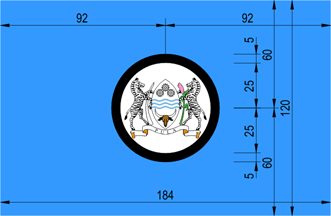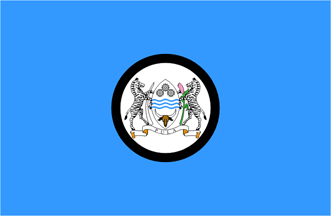
pres.gif) images by Martin Grieve, 16 Dec 2010
images by Martin Grieve, 16 Dec 2010
Last modified: 2022-10-22 by bruce berry
Keywords: president | botswana |
Links: FOTW homepage |
search |
disclaimer and copyright |
write us |
mirrors
 image
by Martin Grieve, 16 Dec 2010
See also:
image
by Martin Grieve, 16 Dec 2010
See also:
The flag of the President takes the blue of the national flag as its field. Centered upon that blue is a black-bordered white disk which reminds one of the colours of the national flag. The national coat of arms is placed upon the white disk. The arms begin with a shield of traditional African shape. It is supported by zebras which hold a tusk and a sorghum plant. Respectively, these represent racial harmony, the wildlife of Botswana, and agriculture of the country. The cogwheels refer to industry while the bull's head symbolizes animal husbandry. The blue wavy, heraldic lines refer to the national motto of "Pula" which means more than its literal translation of 'rain'. Pula is a concept that embodies the belief in the notion that all will be good and well in the future.

pres.gif) images by Martin Grieve, 16 Dec 2010
images by Martin Grieve, 16 Dec 2010
The Presidential banner of Botswana consists of a pale blue field in the
unusual proportions of 15 : 23. In the centre is a white disc with a thick
black fimbriation containing the State Arms. The zebras reflect a
determination to build a society of equal opportunity for persons of all races.
The bull’s head is an emblem of the livestock industry. Cogwheels suggest the
desire for industrialization; the stock of sorghum recalls that the national
economy is still primarily agricultural. The word “Pula” is the
Tswana word for “rain”. Botswana's first President, Dr Seretse Khama
explained that “Rain is our lifeblood and ‘pula’ means more than just
‘rain’. It expresses a hope and a belief that we will win through in the end and
good fortune will be our partner in the years ahead”. (Source:
“Flags and Arms across the World”, by Whitney Smith (1980) [smi80].
Martin Grieve, 16 Dec 2010